About the European Poet of Freedom Festival 2020
19-22 March 2020, Gdańsk
Festival invitation from the members of Programme Board of the European Poet of Freedom Festival
This year, the European Poet of Freedom celebrates its eleventh birthday, which in the case of a biennial event means that in a short while we will inaugurate its sixth edition. However, we do not succumb to the flow of time and invariably strive for the programme of the Festival to remain fresh and interesting both for the new as well as for the returning audience.
In preparing this edition, we have striven to give you the opportunity both to meet the authors of already known poetic languages as well as those who propose solutions that are still waiting to be recognised. This is because we are interested in a discussion about the mutual influence of languages and means of expression. We would like to be able to consider with you whether there really is such a thing as a European cultural exchange, and to what extent the borders of languages and culture contexts are permeable.
The EPoF publishing series will give you a chance to encounter books whose Authors did not have an opportunity to appear in the Polish language before. During the Festival, we will also get to know the texts of Poets visiting Gdansk within the European programme of poetic exchange of young authors Versopolis. While creating the programme, we ensured a considerable number of meetings of foreign authors with the Polish ones, which – we hope – will result in interesting discussions on the subject of mutual poetic influences, differences and similarities.
An interesting and vital element of the programme of this year’s edition of the Festival will be the discussion about the creative freedom within various media and their impact on literature.
We are aware of limits, we observe them, but we also open up to what is new. We hope that you will accompany us.
Tadeusz Dąbrowski, Weronika Janeczko, Barbara Klicka
EUROPEAN POET OF FREEDOM PROGRAMME
Poets and translators nominated for the Award:
Antoine Cassar (Malta) and Zuzanna Gawron for “Czterdzieści dni” [“Forty Days”]
Darko Cvijetić (Bosnia and Herzegovina) and Miłosz Waligórski for “Gęsia skóra” [“Goosebumps”]
Balša Brković (Montenegro) and Agnieszka Schreier for “Czarne boisko” [“Black Pitch”]
Inga Gaile (Latvia) and Agnieszka Smarzewska for “Wielkanoc” [“Easter”]
Sinéad Morrissey (Northern Ireland) and Magda Heydel for “O równowadze” [“On Balance”]
Jean Portante (Luxembourg) and Wawrzyniec Brzozowski for “Po trzęsieniu” [“After The Earthquake”]
Zwiad Ratiani (Georgia) and Magda Nowakowska for “Tobie wolno” [“Only You Are Allowed”]
Agnė Žagrakalytė (Lithuania) and Agnieszka Rebiałkowska for “Właśnie:” [“Here Is:”]
The winners will be chosen by the Jury: Krzysztof Czyżewski – chairman, Paweł Huelle, Zbigniew Mikołejko, Stanisław Rosiek, Anda Rottenberg, Beata Stasińska, Olga Tokarczuk and the not voting jury’s secretary Andrzej Jagodziński.
Previous winners: 2010 – Uładzimir Arłow (Belarus), 2012 – Durs Grünbein (Germany), 2014 – Dorta Jagić (Croatia), 2016 – Ana Blandiana (Romania), 2018 – Linda Vilhjálmsdóttir (Iceland).
Guests of the European Poet of Freedom Festival 2020
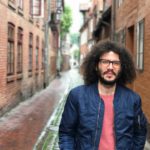 Ramy Al-Asheq is a Berlin based Syrian-Palestinian poet, journalist and curator. He published five poetry collections in Arabic. Many of his texts have been published in anthologies and literature magazines in different countries. Some of his texts were translated into songs, performances and works of fine art. In 2014 Al-Asheq published his first poetry collection in Arabic “Walking on Dreams” after that, he was invited to come to Germany through Artist-in-Residence program of Heinrich-Boell-haus Langenbroich. After one year he received a literature award from Al-Qattan foundation in Ramallah. In 2017 he launched the German-Arabic culture magazine FANN. In addition, he works as a curator for Literaturhaus Berlin and he is co-founder and director of Arabisch-deutschen Literaturtage festival in Berlin. In 2018 he was selected as a fellow of the Academy of Arts in Berlin and won two artist-in-residency scholarships from Künstlerhaus Lukas (Arenshoop) and Künstlerdorf Schöppingen. In 2019, He published his first poetry collection in German translation “Gedächtnishude” which is translated by Lilian Pithan,(Sujet Verlag). In 2020, His first books in English will find their way to be published: “My Heart Became a Bomb” Translated by Levi Thompson, (UT Austin) and “NO One Noticed When You Died” Translated by Isis Nusair, (Seagull books). In 2020, He was selected as a fellow of Academy Schloss Solitude.
Ramy Al-Asheq is a Berlin based Syrian-Palestinian poet, journalist and curator. He published five poetry collections in Arabic. Many of his texts have been published in anthologies and literature magazines in different countries. Some of his texts were translated into songs, performances and works of fine art. In 2014 Al-Asheq published his first poetry collection in Arabic “Walking on Dreams” after that, he was invited to come to Germany through Artist-in-Residence program of Heinrich-Boell-haus Langenbroich. After one year he received a literature award from Al-Qattan foundation in Ramallah. In 2017 he launched the German-Arabic culture magazine FANN. In addition, he works as a curator for Literaturhaus Berlin and he is co-founder and director of Arabisch-deutschen Literaturtage festival in Berlin. In 2018 he was selected as a fellow of the Academy of Arts in Berlin and won two artist-in-residency scholarships from Künstlerhaus Lukas (Arenshoop) and Künstlerdorf Schöppingen. In 2019, He published his first poetry collection in German translation “Gedächtnishude” which is translated by Lilian Pithan,(Sujet Verlag). In 2020, His first books in English will find their way to be published: “My Heart Became a Bomb” Translated by Levi Thompson, (UT Austin) and “NO One Noticed When You Died” Translated by Isis Nusair, (Seagull books). In 2020, He was selected as a fellow of Academy Schloss Solitude.
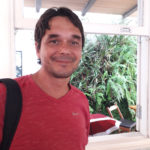 Tomica Bajsić (b. 1968 in Zagreb) is a poet, artist and translator awarded with important national prizes for poetry and translated to many languages. He currently is the president of the Croatian PEN and coordinator of Lyrikline. Bajsić published poetry, travel prose and illustrated books and exhibited photographs of Amazonia in various museums.
Tomica Bajsić (b. 1968 in Zagreb) is a poet, artist and translator awarded with important national prizes for poetry and translated to many languages. He currently is the president of the Croatian PEN and coordinator of Lyrikline. Bajsić published poetry, travel prose and illustrated books and exhibited photographs of Amazonia in various museums.
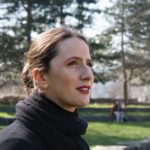 Samantha Barendson is a French, Italian and Argentinian poet. She was born in 1976 in Spain, grew up in Argentina and Mexico and finally settled in France, in Lyons. Like herself, her writing travels from one language to another, and sometimes get mix in a creative reinvention. Author of poetry but also theater plays, she likes to work with other poets, painters, musicians, illustrators and photographers. Then she likes to declaim, perform, yell or sing her poetry on stage, a little frustrated for not being a Tango singer. She is an active member of the Collective: “Le syndicat des poètes qui vont mourir un jour” whose purpose is to promote poetry for everyone and everywhere. In March 2015, she received the French poetry “René Leynaud” award for her poetry book “Le citronnier”.
Samantha Barendson is a French, Italian and Argentinian poet. She was born in 1976 in Spain, grew up in Argentina and Mexico and finally settled in France, in Lyons. Like herself, her writing travels from one language to another, and sometimes get mix in a creative reinvention. Author of poetry but also theater plays, she likes to work with other poets, painters, musicians, illustrators and photographers. Then she likes to declaim, perform, yell or sing her poetry on stage, a little frustrated for not being a Tango singer. She is an active member of the Collective: “Le syndicat des poètes qui vont mourir un jour” whose purpose is to promote poetry for everyone and everywhere. In March 2015, she received the French poetry “René Leynaud” award for her poetry book “Le citronnier”.
Wojciech Boros (b. 1973 in Gdańsk) – a poet. Winner of the “Red Rose” (1996). Holder of the following scholarships: Marshal of the Pomeranian Voivodeship (several times), Mayor of Gdańsk Scholarship (2008) and the Baltic Center for Writers and Translators (Sweden, 2012). Winner of the Award of the Mayor of Gdańsk in the Field of Culture (2013, 2018). In 2013-2014 he took part in the Austrian-Polish artistic project initiated by Josef Trattner titled “SOFA. Polnische sofafahrten / With a sofa in Poland.” His poems were translated into German, Czech, English, Belarusian and Ukrainian. He published several poetry collections: „Nierealit górski” (1997), „Jasne i Pełne” (2003), „Złe zamiary” (2008), „Pies i Pan” (2014) and an audiobook “Empty Night” (2012, with Marcin Dymiter aka Emiter). Editor of poetry in the quarterly “Bliza” (since 2009), a regular collaborator of the literary bimonthly “Autograf”. Organizes poetry evenings, one-line competitions, poetry slams, etc.
Balša Brković (b. 1966 in Titograd, today’s Podgorica) graduated in literature from the University of Belgrade’s Faculty of Philology. He wrote six books of poetry (“Konji jedu breskve”, 1985; “Filip boje srebra”, 1991; “Rt Svete Marije”, 1993; “Contrapposto”, 1998; “Dvojenje”, 2001; “Crno igralište”, 2017), a collection of short stories (“Berlinski krug”, 2008) and three novels “Privatna galerija” (2002), “Paranoja u Podgorici” (2010), and “Plaža Imelde Markos” (2013). “Privatna galerija” was translated into Czech (2007), Slovenian (2006) and Albanian (2007). Brković’s short story “O Enropije Plamenac” (translated by Will Firth) was published in an American anthology of the best European short stories of 2015. For his novel “Privatna galerija”, Brković received the “Mirosavljevo jevanđelje” award for the best prose book published in Serbia and Montenegro between 2001 and 2003. In 2002, it was also one of the four books shortlisted for the Meša Selimović award (for the best novel published in Bosnia and Herzegovina, Serbia, Croatia and Montenegro). In 2017, Brković’s poetry volume “Crno igralište” (Black pitch) received the Risto Ratković award for the best book of poetry published in Serbia, Bosnia and Herzegovina, Croatia and Montenegro. Balša Brković is also involved in theatre criticism, history and ideology of anarchism. For many years, he has worked as the editor of the culture column of Montenegrian newspaper “Vijesti”, and he originated the Saturday “Art” supplement.
 Wawrzyniec Brzozowski (b. 1953 in Kraków) is an art historian and critic, and translator of French literature. He has translated the following books into Polish: Georges Perec „Życie instrukcja obsługi”, Fundacja “Literatura Światowa“, Warsaw 2001 (Literatura na Świecie award), Tereska Torrès “Pamiętnik na trzy głosy”, Wydawnictwo Znak, Kraków 2004, Yves Ternon “Ormianie. Historia zapomnianego ludobójstwa”, Wyd. UJ, Kraków 2005, Eric-Emmanuel Schmitt “Odette i inne historie miłosne”, Wydawnictwo Znak 2009, Georges Perec “O sztuce oraz sposobach usidlenia kierownika działu w celu upomnienia się o podwyżkę”, WAB, Warsaw 2011, Eric-Emmanuel Schmitt “Intrygantki”, Wydawnictwo Znak 2013, Eric-Emmanuel Schmitt “Napój Miłosny”, Wydawnictwo Znak 2013, Claude Burgelin “Georges Perec”, Wydawnictwo Lokator Kraków 2014, Marc Fumaroli “Gdy Europa mówiła po francusku” wyd. Muzeum Łazienki Królewskie, Warsaw 2013, Pierre de Coubertin “Pisma olimpijskie” (Polski Komitet Olimpijski, in preparation), Marcel Proust “W cieniu rozkwitających dziewcząt” (Officyna, in preparation).
Wawrzyniec Brzozowski (b. 1953 in Kraków) is an art historian and critic, and translator of French literature. He has translated the following books into Polish: Georges Perec „Życie instrukcja obsługi”, Fundacja “Literatura Światowa“, Warsaw 2001 (Literatura na Świecie award), Tereska Torrès “Pamiętnik na trzy głosy”, Wydawnictwo Znak, Kraków 2004, Yves Ternon “Ormianie. Historia zapomnianego ludobójstwa”, Wyd. UJ, Kraków 2005, Eric-Emmanuel Schmitt “Odette i inne historie miłosne”, Wydawnictwo Znak 2009, Georges Perec “O sztuce oraz sposobach usidlenia kierownika działu w celu upomnienia się o podwyżkę”, WAB, Warsaw 2011, Eric-Emmanuel Schmitt “Intrygantki”, Wydawnictwo Znak 2013, Eric-Emmanuel Schmitt “Napój Miłosny”, Wydawnictwo Znak 2013, Claude Burgelin “Georges Perec”, Wydawnictwo Lokator Kraków 2014, Marc Fumaroli “Gdy Europa mówiła po francusku” wyd. Muzeum Łazienki Królewskie, Warsaw 2013, Pierre de Coubertin “Pisma olimpijskie” (Polski Komitet Olimpijski, in preparation), Marcel Proust “W cieniu rozkwitających dziewcząt” (Officyna, in preparation).
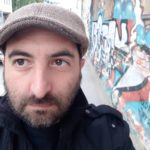 Antoine Cassar (b. 1978 in London) is a Maltese poet, translator, and cultural activist. His latest book, “Erbgħin Jum” (40 Days, publ. by EDE Books, 2017) is a collection of poems on childhood trauma, depression, and walking as a form of self-therapy; in 2018, it was shortlisted for the National Book Award. “Passaport” (2009), a poem published as an anti-passport for all human beings and landscapes, has been published in eleven languages and adapted for the stage in Malta (winning Best Production and Best Actress awards at the MADC One Act Play Festival in 2010); it has also been played in theatres in France, Belgium, Italy and Australia. Cassar’s multilingual poem “Merħba, a poem of hospitality” received the 2009 United Planet Writing Prize. His other publications include the poem “Mappa tal-Mediterran” (Għaqda tal-Malti, 2013) and collection of poems “Bejn / Between” (publ. by Skarta, 2011). Cassar has translated the works of many Maltese writers into English and Spanish. He is greatly devoted to the task of translating Pablo Neruda and Walt Whitman’s oeuvre into Maltese. He created the Spread poetry, not fear project on social media, as a reaction to the 2015 Paris attacks and the related fear-mongering and manipulations in the media.
Antoine Cassar (b. 1978 in London) is a Maltese poet, translator, and cultural activist. His latest book, “Erbgħin Jum” (40 Days, publ. by EDE Books, 2017) is a collection of poems on childhood trauma, depression, and walking as a form of self-therapy; in 2018, it was shortlisted for the National Book Award. “Passaport” (2009), a poem published as an anti-passport for all human beings and landscapes, has been published in eleven languages and adapted for the stage in Malta (winning Best Production and Best Actress awards at the MADC One Act Play Festival in 2010); it has also been played in theatres in France, Belgium, Italy and Australia. Cassar’s multilingual poem “Merħba, a poem of hospitality” received the 2009 United Planet Writing Prize. His other publications include the poem “Mappa tal-Mediterran” (Għaqda tal-Malti, 2013) and collection of poems “Bejn / Between” (publ. by Skarta, 2011). Cassar has translated the works of many Maltese writers into English and Spanish. He is greatly devoted to the task of translating Pablo Neruda and Walt Whitman’s oeuvre into Maltese. He created the Spread poetry, not fear project on social media, as a reaction to the 2015 Paris attacks and the related fear-mongering and manipulations in the media.
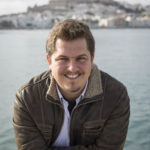 Ben Clark (b. 1984) is a Spanish poet and translator. Two of his most significant books are „Los Hijos De Los Hijos De La Ira”, winner of the Hiperión Prize in 2006, and “La Policía Celeste” which received the international Loewe Poetry Prize 2017, the most prestigious award for an unpublished poetry collection in Spanish language.
Ben Clark (b. 1984) is a Spanish poet and translator. Two of his most significant books are „Los Hijos De Los Hijos De La Ira”, winner of the Hiperión Prize in 2006, and “La Policía Celeste” which received the international Loewe Poetry Prize 2017, the most prestigious award for an unpublished poetry collection in Spanish language.
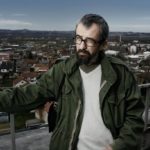 Darko Cvijetić (b. 1968 in Prijedor) is a poet, writer, director, actor and dramaturg from Bosnia and Herzegovina. He is a member of PEN Bosnia and Herzegovina and the Association of Writers of Bosnia and Herzegovina. Cvijetić works as a director and dramaturg at the Prijedor Theatre in Republika Srpska. He is the author of ten books of poetry: “Noćni Gorbačov” (1990, Nocturnal Gorbachev), “Himenica” (1996, Hymen Swallet), “Manifest Mlade Bosne” (2000, Young Bosnia Manifesto), “Passport for Sforland” (2004), “Masovne razglednice iz Bosne” (2012, Mass postcards from Bosnia), “Konopci s otiskom vrata” (2013, Ropes with neckprints), “Mali ekshumatorski eseji” (2015, Smalls essays on exhumation), “Emotikoni u Viberu” (2016, Emoticons on Viber), “Paraolimpijske himne” (2017, Paralympic hymns), “Ježene kožice” (2017, Goosebumps). His poems have been translated into French, English, German, Slovenian, Hebrew, Albanian, Hungarian, Polish, Macedonian and Yiddish. As an actor, he played, among others, in “Crime and Punishment” (dir. by Gradimir Gojer, 2007); “A Tomb for Boris Davidovich” (dir. by Gradimir Gojer, 2009); “Waiting for Godot” (dir. by Radenko Bilbija Clow, 2004); and “Endgame” (dir. by Dragoljub Mutić, 1990). He directed the following plays: “Nije čovjek ko ne umre” (A Man’s Got to Die) by Velimir Stojanović (1991), “Srpska drama” (A Serbian drama) by Siniša Kovačević (1995), Machiavelli’s “The Mandrake” (1997), “Galeb, paviljon 6, po A.P. Čehovu” (The Seagull, Ward. No. 6 after A. Chekhov; 2007), Ronald Harwood’s “Taking Sides” (2007) and “Quartet” (2012), “Feničanke, materijali” (Phoenicians, materials) – original project (2013); “Generacija bez kosti” (Boneless generation) – original project (2015) and “Bunar” (The Well) by Radmila Smiljanić (2016).
Darko Cvijetić (b. 1968 in Prijedor) is a poet, writer, director, actor and dramaturg from Bosnia and Herzegovina. He is a member of PEN Bosnia and Herzegovina and the Association of Writers of Bosnia and Herzegovina. Cvijetić works as a director and dramaturg at the Prijedor Theatre in Republika Srpska. He is the author of ten books of poetry: “Noćni Gorbačov” (1990, Nocturnal Gorbachev), “Himenica” (1996, Hymen Swallet), “Manifest Mlade Bosne” (2000, Young Bosnia Manifesto), “Passport for Sforland” (2004), “Masovne razglednice iz Bosne” (2012, Mass postcards from Bosnia), “Konopci s otiskom vrata” (2013, Ropes with neckprints), “Mali ekshumatorski eseji” (2015, Smalls essays on exhumation), “Emotikoni u Viberu” (2016, Emoticons on Viber), “Paraolimpijske himne” (2017, Paralympic hymns), “Ježene kožice” (2017, Goosebumps). His poems have been translated into French, English, German, Slovenian, Hebrew, Albanian, Hungarian, Polish, Macedonian and Yiddish. As an actor, he played, among others, in “Crime and Punishment” (dir. by Gradimir Gojer, 2007); “A Tomb for Boris Davidovich” (dir. by Gradimir Gojer, 2009); “Waiting for Godot” (dir. by Radenko Bilbija Clow, 2004); and “Endgame” (dir. by Dragoljub Mutić, 1990). He directed the following plays: “Nije čovjek ko ne umre” (A Man’s Got to Die) by Velimir Stojanović (1991), “Srpska drama” (A Serbian drama) by Siniša Kovačević (1995), Machiavelli’s “The Mandrake” (1997), “Galeb, paviljon 6, po A.P. Čehovu” (The Seagull, Ward. No. 6 after A. Chekhov; 2007), Ronald Harwood’s “Taking Sides” (2007) and “Quartet” (2012), “Feničanke, materijali” (Phoenicians, materials) – original project (2013); “Generacija bez kosti” (Boneless generation) – original project (2015) and “Bunar” (The Well) by Radmila Smiljanić (2016).
 Julia Fiedorczuk (b. 1975) is poet, fiction writer, translator and lecturer in American Literature at Warsaw University. She has published six volumes of poetry, two novels, a collection of short stories and essays on poetry and ecology. Her most recent book, “Psalmy” (2017) received the prestigious Wisława Szymborska Prize. Her work has been translated into more than 20 languages.
Julia Fiedorczuk (b. 1975) is poet, fiction writer, translator and lecturer in American Literature at Warsaw University. She has published six volumes of poetry, two novels, a collection of short stories and essays on poetry and ecology. Her most recent book, “Psalmy” (2017) received the prestigious Wisława Szymborska Prize. Her work has been translated into more than 20 languages.
Photo: Kuba Ociepa
Inga Gaile (b. 1976) is a poet, writer, translator, and playwright. She is the author of six books of poetry, including one of children’s poetry. She made her debut as a writer in 2016 with the novel “Stikli” (The Glass Shards), published in a series of historical novels “We. Latvia. The 20th Century”. In 2017, she published her first crime novel (“Invisibles”). In 2018, she plans to complete a collection of poems (Ways of milk). She has translated the oeuvre of Russian-speaking poets into Latvian. Her works, in turn, have been translated into English, German, Swedish, Lithuanian and Bengali. In 2017, a collection of Gaile’s translated poems was published in English as “30 Questions That People Don’t Ask” (Pleiades Press, Missouri, USA) and in Spanish (Circulo de Poesia, Peru, Chile). Inga Gaile is the chair of the Latvian PEN Centre. She also organizes stand-up shows for women, and is herself a performer. Gaile received a number of important Latvian literary awards, including the Klāvs Elsberg award (1999) for her first book of poetry (Laiks bija iemīlējies, 1999), the Ojārs Vācietis award (twice: in 2004 and 2012) for the volumes raudāt nedrīkst smieties (2004) and Migla (2012), and the Latvian Literature Award (2015) for her children’s poetry volume “Vai otrā grupa mani dzird?” (2014).
Zuzanna Gawron (b. 1983 in Warsaw) is a translator and language teacher. Since the age of six, she has been associated with Spain, where she completed Spanish Studies and post-graduate studies in translation and interpretation. She received the scholarship of the Spanish Ministry of Education and Culture (2004–8), and graduated from the Centro del Formación del Teatro de la Escucha in Madrid. She held workshops on social and political theatre in several countries, including Spain and Poland. Gawron translated the poetic prose of Alejandra Pizarnik about the feeling of alienation in language and impossibility to express oneself. The text was adapted for the stage (“Usuwanie Alejandry”, dir. by Edward Gramont, Teatr TAQ, Nowa Sól, 2006 and later productions). Gawron has experienced long-term migration herself, which drove her to research and write about the situation of migrants in the contemporary world, publishing her own texts and articles in journals: the Finnish “Signalu” and Polish “Rita Baum”. Her literary reportages on the subject have been adapted for performative reading (“Noc jest czarna / ciemnoskóra jest noc”) and are still ‘read’. She is currently working on an educational and art project “Migrartes” and completing her translation of A. Cassar’s “Passport”.
 Natalia Gebert is a cultural expert by education, a translator by profession, a bookworm by passion. For over four years, she has been running the informal Dom Otwarty initiative, which supports refugees (not only) in Warsaw, holds workshops on emigration and critical approach to information, and also tries to be a voice in a public debate. In 2018 she received the Award of the Capital City of Warsaw for her activities. During the EPoF festival she will hold children workshops designed around the book “A Boy from Nowhere” by Katherine Marsh (Widnokrąg Publishing).
Natalia Gebert is a cultural expert by education, a translator by profession, a bookworm by passion. For over four years, she has been running the informal Dom Otwarty initiative, which supports refugees (not only) in Warsaw, holds workshops on emigration and critical approach to information, and also tries to be a voice in a public debate. In 2018 she received the Award of the Capital City of Warsaw for her activities. During the EPoF festival she will hold children workshops designed around the book “A Boy from Nowhere” by Katherine Marsh (Widnokrąg Publishing).
 Georgi Gospodinov (b. 1968 in Bulgaria) – a poet, writer, literary critic. Winner of Central European Angelus Award 2019 for his novel “The Physics of Sorrow” translated into Polish by Magdalena Pytlak. The book has also won Jan Michalski Prize (2016) and was a finalist for major European and American prizes. His books were translated into 25 languages. Gospodinov is an author of 7 poetry collections, the most recent one is “Where We Are Not” (2016, The Quill Award for Poetry). “Blind Vaysha”, a short animation (dir. Theo Ushev) based on Gospodinov’s short story made it to the Academy Awards nominees in 2017. He is also author of a graphic novel, libretto for “Space Opera” (2015, Poznan, composer Alexander Nowak), scripts for short feature films, some social video projects etc.
Georgi Gospodinov (b. 1968 in Bulgaria) – a poet, writer, literary critic. Winner of Central European Angelus Award 2019 for his novel “The Physics of Sorrow” translated into Polish by Magdalena Pytlak. The book has also won Jan Michalski Prize (2016) and was a finalist for major European and American prizes. His books were translated into 25 languages. Gospodinov is an author of 7 poetry collections, the most recent one is “Where We Are Not” (2016, The Quill Award for Poetry). “Blind Vaysha”, a short animation (dir. Theo Ushev) based on Gospodinov’s short story made it to the Academy Awards nominees in 2017. He is also author of a graphic novel, libretto for “Space Opera” (2015, Poznan, composer Alexander Nowak), scripts for short feature films, some social video projects etc.
Magda Heydel (b. 1969) is a translator of English-speaking literature. She has translated, among others, the works of Virginia Woolf, Joseph Conrad, T.S. Eliot, Derek Walcott, Seamus Heaney, and Roald Dahl. Heydel has received the Literatura na Świecie award twice. She edited “Przekłady poetyckie wszystkie Czesława Miłosza” (2015) and “444 wiersze poetów języka angielskiego XX wieku” by Stanisław Barańczak (2017). She teaches the theory and practice of literary translation at the Jagiellonian University’s Faculty of Polish Studies, and is the head of the Literary and Cultural Translation Studies (MA course). She co-wrote the anthologies “Współczesne teorie przekładu” (2009) and “Polska myśl przekładoznawcza” (2013), and is the editor-in-chief of “Przekładaniec. A Journal of Translation Studies”. One of her most recent book is “Gorliwość tłumacza. Przekład poetycki w dziele Czesława Miłosza” (2013).
 Maarten Inghels (b. 1988 in Belgium) is a poet and writer. From 2016 till 2018 he was the official City Poet of Antwerp in Belgium. His latest book Contact connects poetry, visual arts and actions and received wide critical acclaim. His poems appeared as a tattoo for eleven people (Hunger) and were sown with vegetables (When we sow summer in each other). With Polling the People, he wrote a poem of 35 verses that poses an equal number of questions of the city’s inhabitants on their disposition, beliefs and culture. The poem with response form charted the city dweller’s identity and led to a correspondence with the community. He coordinated The Lonely Funeral in Belgium, a social and literary project which provides poets to speak at funerals of those without relatives and friends to attend. An eponymous anthology was published in Dutch, German (Edition Korrespondenzen) and English (Arc Publications).
Maarten Inghels (b. 1988 in Belgium) is a poet and writer. From 2016 till 2018 he was the official City Poet of Antwerp in Belgium. His latest book Contact connects poetry, visual arts and actions and received wide critical acclaim. His poems appeared as a tattoo for eleven people (Hunger) and were sown with vegetables (When we sow summer in each other). With Polling the People, he wrote a poem of 35 verses that poses an equal number of questions of the city’s inhabitants on their disposition, beliefs and culture. The poem with response form charted the city dweller’s identity and led to a correspondence with the community. He coordinated The Lonely Funeral in Belgium, a social and literary project which provides poets to speak at funerals of those without relatives and friends to attend. An eponymous anthology was published in Dutch, German (Edition Korrespondenzen) and English (Arc Publications).
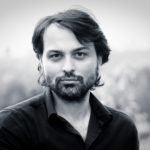 Federico Italiano (b. 1976 in Italy) is a poet, translator, publisher, essayist, literary critic and editor. He works as senior researcher at the Österreichische Akademie der Wissenschaften in Vienna and teaches general and comparative literature at the University of Munich (LMU). Together with his German colleague Jan Wagner, he is editor of the anthology ”Grand Tour. A Voyage Through The Young European Poetry” (2019).
Federico Italiano (b. 1976 in Italy) is a poet, translator, publisher, essayist, literary critic and editor. He works as senior researcher at the Österreichische Akademie der Wissenschaften in Vienna and teaches general and comparative literature at the University of Munich (LMU). Together with his German colleague Jan Wagner, he is editor of the anthology ”Grand Tour. A Voyage Through The Young European Poetry” (2019).
Helen Ivory is a poet and visual artist. She edits the webzine Ink Sweat and Tears and is tutor and Course Director for the UEA/National Centre for Writing online creative writing programme.She has won an Eric Gregory Award and her fifth Bloodaxe Books collection, The Anatomical Venus was short-listed for the East Anglian Book Awards (2019) and won the East Anglian Writers ‘By the Cover’ Award (EABA 2019). The Anatomical Venus examines how women have been portrayed as ‘other’; as witches; as hysterics with wandering wombs and as beautiful corpses cast in wax, or on mortuary slabs in TV box sets, is available here: www.bloodaxebooks.com. Fool’s World a collaborative Tarot with the artist Tom de Freston (Gatehouse Press) won the 2016 Saboteur Award for Best Collaborative Work. Hear What the Moon Told Me, a book of collage/ mixed media/ acrylic painted poems was published in 2016 by Knives Forks and Spoons Press, and a chapbook Maps of the Abandoned City was published in January 2019 by SurVision. She lives in Norwich with her husband, the poet Martin Figura.
 Jerzy Jarniewicz (born in 1958) – a literary critic, poet, translator. Author of fifteen books of esseys, among others: „Gościnność słowa. Szkice o przekładzie literackim” (2012), „Tłumacz między innymi (2018, nominated to Nike Literary Award) and „Bunt wizjonerów” (2019). He has published twelve volumes of poetry, for „Puste noce” (2017) he received Silesius Poetry Award for the book of the year. He has translated works of James Joyce, Philip Roth, Raymond Carver, John Banville, Ursula le Guin and many other writers of the English language. He has worked on anthologies „Sześć poetek irlandzkich” (2012), „Poetki z Wysp” (2015, with Magda Heydel) and „100 wierszy wypisanych z języka angielskiego” (2018). Lives in Łódź.
Jerzy Jarniewicz (born in 1958) – a literary critic, poet, translator. Author of fifteen books of esseys, among others: „Gościnność słowa. Szkice o przekładzie literackim” (2012), „Tłumacz między innymi (2018, nominated to Nike Literary Award) and „Bunt wizjonerów” (2019). He has published twelve volumes of poetry, for „Puste noce” (2017) he received Silesius Poetry Award for the book of the year. He has translated works of James Joyce, Philip Roth, Raymond Carver, John Banville, Ursula le Guin and many other writers of the English language. He has worked on anthologies „Sześć poetek irlandzkich” (2012), „Poetki z Wysp” (2015, with Magda Heydel) and „100 wierszy wypisanych z języka angielskiego” (2018). Lives in Łódź.
 Paweł Kaczmarski – a literary critic. An editor of an anthology of young poetry “Zebrało się śliny“ (2016) and several poetry selections, author of a book “Wysoka łączliwość. Szkice o poezji współczesnej” (2019). He co-edits the 8. Arkusz Odry magazine, translation magazine WIDMA. Kaczmarski is a member of the editorial staff of the scientific journal Practice Teoretycza.
Paweł Kaczmarski – a literary critic. An editor of an anthology of young poetry “Zebrało się śliny“ (2016) and several poetry selections, author of a book “Wysoka łączliwość. Szkice o poezji współczesnej” (2019). He co-edits the 8. Arkusz Odry magazine, translation magazine WIDMA. Kaczmarski is a member of the editorial staff of the scientific journal Practice Teoretycza.
 Luke Kennard is a poet and novelist from the United Kingdom. His second book of poems “The Harbour Beyond the Movie” (Salt, 2007) was shortlisted for the Forward Prize, making him, at the time, the youngest writer to be nominated. His fifth collection, “Cain” (Penned in the Margins, 2016), was shortlisted for the International Dylan Thomas Prize 2017. His first novel, “The Transition” (4th Estate, 2017) was longlisted for the Desmond Elliott award. He lectures at the University of Birmingham in the School of English.
Luke Kennard is a poet and novelist from the United Kingdom. His second book of poems “The Harbour Beyond the Movie” (Salt, 2007) was shortlisted for the Forward Prize, making him, at the time, the youngest writer to be nominated. His fifth collection, “Cain” (Penned in the Margins, 2016), was shortlisted for the International Dylan Thomas Prize 2017. His first novel, “The Transition” (4th Estate, 2017) was longlisted for the Desmond Elliott award. He lectures at the University of Birmingham in the School of English.
 Marta Koronkiewicz – literary scholar, literary critic. She works in the Institute of Polish Philology of the University of Wrocław. An editor of the anthology of young poetry ‘Zebrało się śliny’ (2016), author of the book ‘I jest moc odległego życia w tej elegii. Uwagi o wierszach Andrzeja Sosnowskiego”(2019). She co-edits the 8. Arkusz Odry magazine, translation magazine WIDMA. Koronkiewicz is a member of the editorial staff of the scientific journal Practice Teoretycza.
Marta Koronkiewicz – literary scholar, literary critic. She works in the Institute of Polish Philology of the University of Wrocław. An editor of the anthology of young poetry ‘Zebrało się śliny’ (2016), author of the book ‘I jest moc odległego życia w tej elegii. Uwagi o wierszach Andrzeja Sosnowskiego”(2019). She co-edits the 8. Arkusz Odry magazine, translation magazine WIDMA. Koronkiewicz is a member of the editorial staff of the scientific journal Practice Teoretycza.
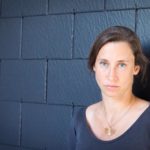 Zofia Król – editor-in-chief and editor of the literature department of the culture magazine ‘Dwutygodnik’. She also published in Gazeta Wyborcza, Tygodnik Powszechny and Pismo. Critic and historian of literature, doctor of philosophy. Author of a book “Powrót do świata. Dzieje uwagi w filozofii i literaturze XX wieku”(2013). Jury member of the Witold Gombrowicz Award and the Conrad Award.
Zofia Król – editor-in-chief and editor of the literature department of the culture magazine ‘Dwutygodnik’. She also published in Gazeta Wyborcza, Tygodnik Powszechny and Pismo. Critic and historian of literature, doctor of philosophy. Author of a book “Powrót do świata. Dzieje uwagi w filozofii i literaturze XX wieku”(2013). Jury member of the Witold Gombrowicz Award and the Conrad Award.
Photo: Anna Rezulak / Gdynia Award
 Małgorzata Lebda (b. 1985) is a poet and an academic teacher. She holds PhD in humanities (specializing in theory of literature and audiovisual arts). The author of five poetry books, the latest of which, “Sny uckermärkerów” (WBPiCAK, Poznań 2018) was nominated to the Wroclaw Silesius Award (2019) and received the Gdynia Literary Award. Her books have been translated into Czech (by Bogdan Trojak), Italian (by Marina Ciccarini) and Serbian (by Biserka Rajčić). An ultra marathon runner and mountaineer who loves to photograph. She lives in Kraków.
Małgorzata Lebda (b. 1985) is a poet and an academic teacher. She holds PhD in humanities (specializing in theory of literature and audiovisual arts). The author of five poetry books, the latest of which, “Sny uckermärkerów” (WBPiCAK, Poznań 2018) was nominated to the Wroclaw Silesius Award (2019) and received the Gdynia Literary Award. Her books have been translated into Czech (by Bogdan Trojak), Italian (by Marina Ciccarini) and Serbian (by Biserka Rajčić). An ultra marathon runner and mountaineer who loves to photograph. She lives in Kraków.
Nikola Madžirov (b. 1973 in Strumica, R.Macedonia, in the family of war refugees from the Balkan Wars) is a poet, essayist, translator. For the book “Relocated Stone” (2007) was given the East European Hubert Burda poetry award and the most prestigious Macedonian poetry prize Miladinov Brothers at Struga Poetry Evenings. Other awards include Studentski Zbor award for best debut in Macedonia and Xu Zhimo Silver Leaf award for European poetry at King’s College, Cambridge. His poems are translated into more than thirty languages. American jazz composer Oliver Lake and Italian contemporary composer Angelo Inglese have composed music based on Madzirov’s poems. He was granted several international fellowships: International Writing Program (IWP) at University of Iowa in USA; DAAD in Berlin; Civitella Ranieri in Italy/USA and Marguerite Yourcenar in France. Madzirov is one of the coordinators of the international poetry network Lyrikline.org based in Berlin. He lives in Strumica.
Sinéad Morrissey (b. 1972 in Country Armagh, Northern Ireland, and raised in Belfast) is a graduate of Trinity College in Dublin. She spent long periods abroad, among others in Japan and New Zealand, before returning to Belfast. In 2014, the city appointed her its inaugural poet laureate. Morrissey wrote six books of poetry: “There Was Fire in Vancouver” (1996), “Between Here and There” (2001), “The State of the Prisons” (2005), “Through the Square Window” (2009), “Parallax and Selected Poems” (2013), and “On Balance” (2017). “Parallax” won the T.S. Eliot prize and was shortlisted for the National Book Critics Circle Award. Morrissey has also received the Patrick Kavanagh Poetry Award, the Irish Times Poetry Now Award, a Lannan Literary Fellowship, and first place in the 2007 UK National Poetry Competition. Her volume “On Balance” won the Forward Prize for the best collection of poetry. Sinéad Morrissey teaches creative writing at the Seamus Heaney Centre for Poetry, Queen’s University, Belfast and at Newcastle University.
Magdalena Nowakowska is a translator of Georgian, cultural manager, and promoter of Georgian culture. She has translated works by a number of contemporary Georgian writers, including “Adibas” by Zaza Burchuladze, “Załzawione okulary” by Gogi Gvakharia, and “Ptaki i ludzie” by Archil Kikodze.
 Gonca Özmen (b. 1982 in Turkey) is one of the editors of the literary magazine “Çevrimdışı Istanbul” and member of the advisory boards of Bursa Nilüfer International Poetry Festival and the yearbook “Turkish Poetry Today” (Red Hand Books, UK). Her first poetry collection “Kuytumda” (“In My Nook”, 2000) won the Orhon Murat Arıburnu Poetry Prize and the Berna Moran Poetry Prize. Her second poetry collection “Belki Sessiz” (“Maybe Silent”) appeared in 2008 and was also translated into German.
Gonca Özmen (b. 1982 in Turkey) is one of the editors of the literary magazine “Çevrimdışı Istanbul” and member of the advisory boards of Bursa Nilüfer International Poetry Festival and the yearbook “Turkish Poetry Today” (Red Hand Books, UK). Her first poetry collection “Kuytumda” (“In My Nook”, 2000) won the Orhon Murat Arıburnu Poetry Prize and the Berna Moran Poetry Prize. Her second poetry collection “Belki Sessiz” (“Maybe Silent”) appeared in 2008 and was also translated into German.
Jean Portante (b. 1950 in Differdange, Luxembourg, where his parents emigrated from Italy) is the author of more than ten collections of poems, several novels and theatre plays, many of which have been translated into around 20 languages. He is also a translator of literature (mostly poetry) from several languages. He lives in Paris, but maintains close ties with Luxembourg, where he works as the artistic director of the “Printemps des poètes” poetry festival, literary editor of „TRANSKRIT” magazine and journalist for “Jeudi” weekly; he also lectures at the Institut national des langues. In France, he is a member of Académie Mallarmé and sits on the jury of many literary awards (Apollinaire, Mallarmé, Max–Pol Fouchet, Yvan Goll, etc.). Together with Claud Couffon, he is the head of the “Cahiers latins” series (publ. by Caractères). Portante, Jacques Darras and Jean–Yves Reuzeau founded the “Inuits dans la jungle” literary magazine. Portante has received the Prix Ruteboef, Prix Tony Bourg, Prix Servais (twice), Louis Montalo, and Batty Weber awards. In 2003, in France, he received the Grand Prix d’automne de la Société des gens de lettres for lifetime achievement and the Prix Mallarmé for his collection of poetry L’étrange langue. In 2011, he won the Luxembourg state award for lifetime achievement. He visited Poland several times, meeting with the readers (e.g., Czas Poetów – Poezja w czasie kryzysu, Lublin 2012, and Ars Cameralis, Katowice 2017).
 Josep Pedrals (b. in1979 in Barcelona) is a poet and performer. Since 1997 he brings his poetry to stages. He has performed throughout Europe, Asia and America, giving thousands of recitals.He has been awarded invarious contestsof recitation, including the Osaka International Slam (2009). He works in poetry education for children and adults and gives lectures and courses on poetry, prosody and orality. He has developed poetry spaces on radio and television and has collaborated in art and culture sections of various publications. He has written several theatre plays. He leads the ironic popgroup ElsNensEutròfics. He was awarded with the “Lletra d’or” prize in 2013 (to the best catalan book) and the Time Out Barcelona Best Artist of the Year 2014 prize. Josep Pedrals is pure spectacle. His poetry, written and recited mostly in Catalan, is conveyed through this language to create endless phonic games, tonal experiences close to music, beatbox. He is one of the Spanish poets with the most experience in language and metrics, something that would categorize his work close to poetic classicism if his topics did not have a high humorous and ironic content. Pedrals plays with the rhyme, the cacophony, the hyperbaton, the meter, the overlaps and all with a naughty, electrifying, fresh rhythm. His recitals are dancers, sharp, pure percussion of words and a wide range of themes. He is a true expert of the verbal and the high level of musicality that he incorporates to the language makes his poetry unique.
Josep Pedrals (b. in1979 in Barcelona) is a poet and performer. Since 1997 he brings his poetry to stages. He has performed throughout Europe, Asia and America, giving thousands of recitals.He has been awarded invarious contestsof recitation, including the Osaka International Slam (2009). He works in poetry education for children and adults and gives lectures and courses on poetry, prosody and orality. He has developed poetry spaces on radio and television and has collaborated in art and culture sections of various publications. He has written several theatre plays. He leads the ironic popgroup ElsNensEutròfics. He was awarded with the “Lletra d’or” prize in 2013 (to the best catalan book) and the Time Out Barcelona Best Artist of the Year 2014 prize. Josep Pedrals is pure spectacle. His poetry, written and recited mostly in Catalan, is conveyed through this language to create endless phonic games, tonal experiences close to music, beatbox. He is one of the Spanish poets with the most experience in language and metrics, something that would categorize his work close to poetic classicism if his topics did not have a high humorous and ironic content. Pedrals plays with the rhyme, the cacophony, the hyperbaton, the meter, the overlaps and all with a naughty, electrifying, fresh rhythm. His recitals are dancers, sharp, pure percussion of words and a wide range of themes. He is a true expert of the verbal and the high level of musicality that he incorporates to the language makes his poetry unique.
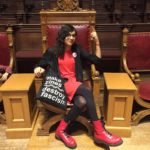 Nat Raha is a poet, activist and scholar living in Edinburgh, Scotland. Her poetry includes “of sirens, body & faultlines” (Boiler House Press, 2018), “countersonnets” (Contraband Books, 2013), and Octet (Veer Books, 2010). Her poetry is of an innovative, condensed and politicised lyric, speaking of marginal forms of living and queer desires, feeling through feminist diasporas and generative constraints. Her work has been translated into French, German, Greek, Portuguese and Spanish. Nat holds a PhD in Creative and Critical Writing from the University of Sussex, UK, and co-edits “Radical Transfeminism” zine.
Nat Raha is a poet, activist and scholar living in Edinburgh, Scotland. Her poetry includes “of sirens, body & faultlines” (Boiler House Press, 2018), “countersonnets” (Contraband Books, 2013), and Octet (Veer Books, 2010). Her poetry is of an innovative, condensed and politicised lyric, speaking of marginal forms of living and queer desires, feeling through feminist diasporas and generative constraints. Her work has been translated into French, German, Greek, Portuguese and Spanish. Nat holds a PhD in Creative and Critical Writing from the University of Sussex, UK, and co-edits “Radical Transfeminism” zine.
 Zviad Ratiani (b. 1971) is a poet and translator. He is firmly rooted in the Georgian literary scene and his works have appeared in print since 1992. Ratiani has published five collections of poetry, at the same time translating English and German poems into Georgian. Among his many translations, Zviad Ratiani introduced Georgian readers to such eminent works as the poetry of T.S. Eliot, E. Pound, R. Frost, R.M. Rilke and Paul Celan. For translating the oeuvre of the latter, he received the Goethe Institut Award for the best translation of the year. In 2005, Ratiani received the SABA – the most important Georgian literary award. His poems have been translated into English, German, French, Russian, Azerbaijani, Ukrainian, and Latvian, among others. His poetry appeared in numerous anthologies, such as “Ich aber will dem Kaukasos zu…” Pop Verlag 2015, Germany; “Aus der Ferne: Neue Georgische Lyrik”, Corvinus Presse 2016, Germany.
Zviad Ratiani (b. 1971) is a poet and translator. He is firmly rooted in the Georgian literary scene and his works have appeared in print since 1992. Ratiani has published five collections of poetry, at the same time translating English and German poems into Georgian. Among his many translations, Zviad Ratiani introduced Georgian readers to such eminent works as the poetry of T.S. Eliot, E. Pound, R. Frost, R.M. Rilke and Paul Celan. For translating the oeuvre of the latter, he received the Goethe Institut Award for the best translation of the year. In 2005, Ratiani received the SABA – the most important Georgian literary award. His poems have been translated into English, German, French, Russian, Azerbaijani, Ukrainian, and Latvian, among others. His poetry appeared in numerous anthologies, such as “Ich aber will dem Kaukasos zu…” Pop Verlag 2015, Germany; “Aus der Ferne: Neue Georgische Lyrik”, Corvinus Presse 2016, Germany.
 Agnieszka Rembiałkowska (b. 1980 in Włocławek) graduated in Baltic Studies from the University of Warsaw, completed several long-term internships at Lithuanian universities and currently lectures at the Baltic Studies Unit of the University of Warsaw’s Faculty of Polish Studies. She is a member of the Association of Literary Translators. She likes words, but she prefers thinking to writing. Her first literary translation from Lithuanian was published in 2005. Rembiałkowska took part in a number of Polish-Lithuanian translation projects, such as “Pamario literatūra lenkiškai=Literatura litewskiego Pomorza po polsku” (2007–8) and “Simonaitytė prabyla lenkiškai=Simonaitytė po polsku” (2018), as well as international translation seminars, including “Literatūros seimelis=Sejmik literacki” (od 2013), and “Tłumacze Bez Granic” (2013, 2014, 2017). She has contributed to the preparation of a Polish anthology of 20th-century Lithuanian poetry. She received the Poezijos pavasaris (Poetry Spring) festival award for her translations of Lithuanian poetry into Polish (2018). She has translated poems by Vladas Braziūnas, Rasa Čergelienė, Nijolė Daujotytė, Sigitas Geda, Dainius Gintalas, Birutė Jonuškaitė, Antanas A. Jonynas, Elena Karnauskaitė, Aušra Kaziliūnaitė, Giedrė Kazlauskaitė, Jonas Liniauskas and Agnė Žagrakalytė.
Agnieszka Rembiałkowska (b. 1980 in Włocławek) graduated in Baltic Studies from the University of Warsaw, completed several long-term internships at Lithuanian universities and currently lectures at the Baltic Studies Unit of the University of Warsaw’s Faculty of Polish Studies. She is a member of the Association of Literary Translators. She likes words, but she prefers thinking to writing. Her first literary translation from Lithuanian was published in 2005. Rembiałkowska took part in a number of Polish-Lithuanian translation projects, such as “Pamario literatūra lenkiškai=Literatura litewskiego Pomorza po polsku” (2007–8) and “Simonaitytė prabyla lenkiškai=Simonaitytė po polsku” (2018), as well as international translation seminars, including “Literatūros seimelis=Sejmik literacki” (od 2013), and “Tłumacze Bez Granic” (2013, 2014, 2017). She has contributed to the preparation of a Polish anthology of 20th-century Lithuanian poetry. She received the Poezijos pavasaris (Poetry Spring) festival award for her translations of Lithuanian poetry into Polish (2018). She has translated poems by Vladas Braziūnas, Rasa Čergelienė, Nijolė Daujotytė, Sigitas Geda, Dainius Gintalas, Birutė Jonuškaitė, Antanas A. Jonynas, Elena Karnauskaitė, Aušra Kaziliūnaitė, Giedrė Kazlauskaitė, Jonas Liniauskas and Agnė Žagrakalytė.
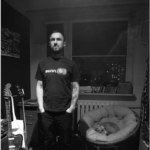 Artur Rumiński is a guitarist of bands Furia, Thaw, ARRM, Mentor, Gruzja. As a session guitarist, he collaborated with band Tides From Nebula. Several times magazine “The Metal Hammer” has chosen him a musician of the year. With Furia he performed music for a play “Wesele” directed by Jan Klata at the Stary Theatre in Krakow.
Artur Rumiński is a guitarist of bands Furia, Thaw, ARRM, Mentor, Gruzja. As a session guitarist, he collaborated with band Tides From Nebula. Several times magazine “The Metal Hammer” has chosen him a musician of the year. With Furia he performed music for a play “Wesele” directed by Jan Klata at the Stary Theatre in Krakow.
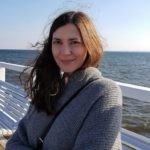 Agnieszka Schreier (b. 1978 in Gdynia) is a graduate of English Studies and Psychology, translator of English, French and South Slavic languages (Bosnian, Croatian, Montenegrin and Serbian). In 2017, her translation of Faruk Šehić’s “Książka o Unie” was shortlisted for the “Angelus” Central European Literary Award. She has also translated poems, including by Faruk Šehić.
Agnieszka Schreier (b. 1978 in Gdynia) is a graduate of English Studies and Psychology, translator of English, French and South Slavic languages (Bosnian, Croatian, Montenegrin and Serbian). In 2017, her translation of Faruk Šehić’s “Książka o Unie” was shortlisted for the “Angelus” Central European Literary Award. She has also translated poems, including by Faruk Šehić.
 Agnieszka Smarzewska (b. 1987) is a translator, editor of “Przegląd Bałtycki”, author of short stories, and copywriter. She graduated in Baltic Studies from the University of Warsaw. Most of her texts have been published in literary magazines, such as “Bluszcz”, “Borussia”, “Korespondencja z ojcem”, “Wizje”, and “Znad Wilii”. So far, she has mostly translated Latvian interwar poetry into Polish (Aleksandrs Čaks, Austra Skujiņa). She lives in Warsaw.
Agnieszka Smarzewska (b. 1987) is a translator, editor of “Przegląd Bałtycki”, author of short stories, and copywriter. She graduated in Baltic Studies from the University of Warsaw. Most of her texts have been published in literary magazines, such as “Bluszcz”, “Borussia”, “Korespondencja z ojcem”, “Wizje”, and “Znad Wilii”. So far, she has mostly translated Latvian interwar poetry into Polish (Aleksandrs Čaks, Austra Skujiņa). She lives in Warsaw.
 Marcin Świątkowski is a poetry critic, teacher and PhD student at the Department of Literary Criticism at Jagiellonian University. He published in “Mały Format”, “Xięgarnia”, “ArtPapier”, “Bez Porównania”, “Kraków” and others. Vice-president of the board of the KONTENT Foundation.
Marcin Świątkowski is a poetry critic, teacher and PhD student at the Department of Literary Criticism at Jagiellonian University. He published in “Mały Format”, “Xięgarnia”, “ArtPapier”, “Bez Porównania”, “Kraków” and others. Vice-president of the board of the KONTENT Foundation.
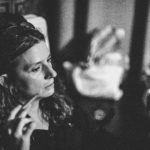 Małgorzata “Tekla” Tekiel is a musician, bass player, composer. Collaborates with bands Praised, Janerka Na Basy i Głosy, Morświn (with Marcin Świetlicki). She worked with bands Will Good, Püdelsi, Szum, Pati Yang, Magic Carpathians and Deuter. She composes music for theatre.
Małgorzata “Tekla” Tekiel is a musician, bass player, composer. Collaborates with bands Praised, Janerka Na Basy i Głosy, Morświn (with Marcin Świetlicki). She worked with bands Will Good, Püdelsi, Szum, Pati Yang, Magic Carpathians and Deuter. She composes music for theatre.
 Jan Wagner (b. 1971 in Hamburg) is a poet, translator of English poetry, essayist and critic. He received numerous scholarships and awards for his work, most recently the Georg Büchner Prize (2017). Together with his Italian colleague Federico Italiano, he is editor of the anthology ”Grand Tour. A Voyage Through The Young European Poetry” (2019). Jan Wagner is a member of the Deutsche Akademie für Sprache und Dichtung and other academies and lives in Berlin.
Jan Wagner (b. 1971 in Hamburg) is a poet, translator of English poetry, essayist and critic. He received numerous scholarships and awards for his work, most recently the Georg Büchner Prize (2017). Together with his Italian colleague Federico Italiano, he is editor of the anthology ”Grand Tour. A Voyage Through The Young European Poetry” (2019). Jan Wagner is a member of the Deutsche Akademie für Sprache und Dichtung and other academies and lives in Berlin.
Photo: Nadine Kunath
 Miłosz Waligórski (b. 1981 in Bydgoszcz) is a graduate of Slavic and Hungarian studies. He lives and works in Novi Sad. Waligórski received the Adam Włodek Award (2015) and “Strzała Łuczniczki” Bydgoszcz Literary Award (2018). His translations from Hungarian, Slovakian and Serbo-Croatian as well as his own poetry and prose have been published in numerous magazines. His works have been translated into Slovenian, Rusyn and Serbian. Among other he translated “Poświęcenie hetmana” by Lajos Grendel (2014), “Doniesienia z krainy ciemności” by Dževad Karahasan (2014), “Entropia” by Maroš Krajňak (2015), “Drugi pocałunek Gity Danon” by Miljenko Jergović (2016), “Dzwony Einsteina” by Lajos Grendel (2016), “Jarmarczny kuglarz” by Jelena Lengold (2016), “Programy w labiryncie” by István Kemény (2017). He is the author of translations of new Serbian poems published in the anthology “Serce i krew” (2015). Waligórski published four books of poetry: “36 sposobów na pustkę” (2012), “32 ślady ku” (2015), “Długopis” (2017) and “Sztuka przekładu” (2018) – and collections of short stories: “Kto to widział” (2016) and “Małe prozy” (2016, together with Anna Waligórska).
Miłosz Waligórski (b. 1981 in Bydgoszcz) is a graduate of Slavic and Hungarian studies. He lives and works in Novi Sad. Waligórski received the Adam Włodek Award (2015) and “Strzała Łuczniczki” Bydgoszcz Literary Award (2018). His translations from Hungarian, Slovakian and Serbo-Croatian as well as his own poetry and prose have been published in numerous magazines. His works have been translated into Slovenian, Rusyn and Serbian. Among other he translated “Poświęcenie hetmana” by Lajos Grendel (2014), “Doniesienia z krainy ciemności” by Dževad Karahasan (2014), “Entropia” by Maroš Krajňak (2015), “Drugi pocałunek Gity Danon” by Miljenko Jergović (2016), “Dzwony Einsteina” by Lajos Grendel (2016), “Jarmarczny kuglarz” by Jelena Lengold (2016), “Programy w labiryncie” by István Kemény (2017). He is the author of translations of new Serbian poems published in the anthology “Serce i krew” (2015). Waligórski published four books of poetry: “36 sposobów na pustkę” (2012), “32 ślady ku” (2015), “Długopis” (2017) and “Sztuka przekładu” (2018) – and collections of short stories: “Kto to widział” (2016) and “Małe prozy” (2016, together with Anna Waligórska).
Agnė Žagrakalytė (b. 1979 in Puodžiai, Pasvalys District Council) is a poet, novelist, essayist and feature writer, graduate of Lithuanian studies at the Vilnius Pedagogical University. Žagrakalytė debuted as a poet in 1996 – in the same year, even before her first book of poetry was published, she received the award for the best poetry debut. She currently lives in Brussels with her family. Žagrakalytė writes essays and features for Lithuanian magazines on culture. She sketches when she writes, and trains iaidō. Žagrakalytė is the author of three books of poetry: “Išteku” (I’m getting married, 2003), “Visa tiesa apie Alisą Meler” (The whole truth about Alisa Meler, 2008), “Štai:” (Here is, 2017), and two novels: “Eigulio duktė: byla F/117” (The lumberjack’s daughter: case no. F/117, 2013), a family saga based on actual events, and a “literary comic strip” “Klara” (Clara, 2014). Translations of her poems have appeared in anthologies of “emerging Lithuanian poetry”: “Six Young Lithuanian Poets” (selected by K. S. Keys, 2002), “Artistic Cloning” (2010, transl. by J. Zdanys), “Coeurs ébouillantés: Nuplikytom širdim” (ed. by N. Barriere, D. Sakalauskaitė, 2013), and “How the Earth Carries Us: New Lithuanian Poets” (ed. by M. Burokas, 2015). Žagrakalytė has won important Lithuanian literary awards, such as the Liūnė Sutema award (1996, for emerging young writers) and the Jurga Ivanauskaitė award for “courage, openness and freedom of artistic expression “ (2014, for the novel “Eigulio duktė: byla F/117”), as well as a number of festival awards, e.g. Poezijos pavasaris (Poetry Spring, 1998) and Poetinis Druskininkų ruduo (Druskininkai Poetry Autumn 2003). Her volume “Štai:” received first place in the 2017 Book of the Year poll (in the poetry category). Agnė Žagrakalytė’s works have been translated into English, French, German, Slovenian, Italian and Polish (publications in literary periodicals).

